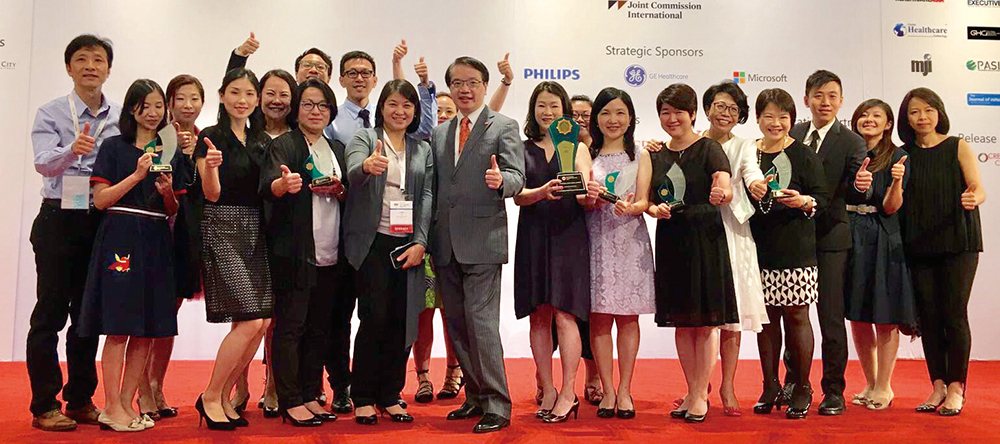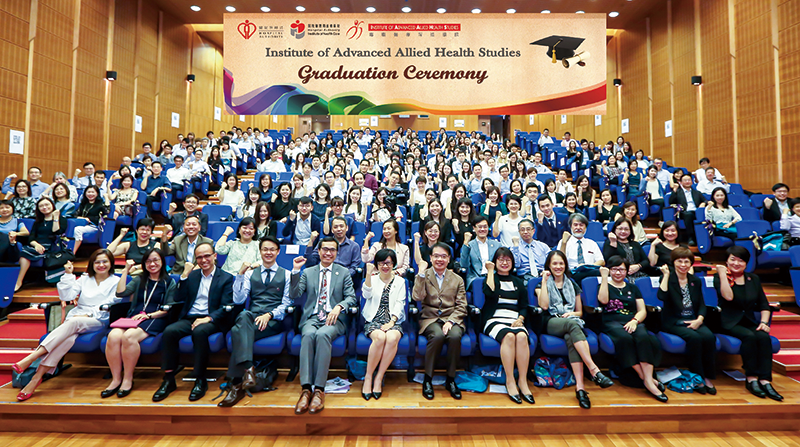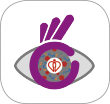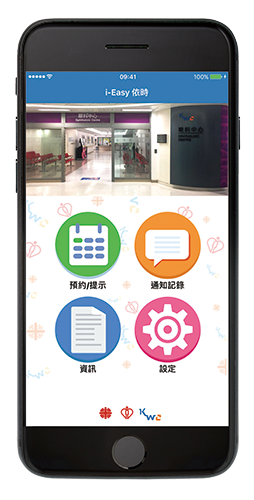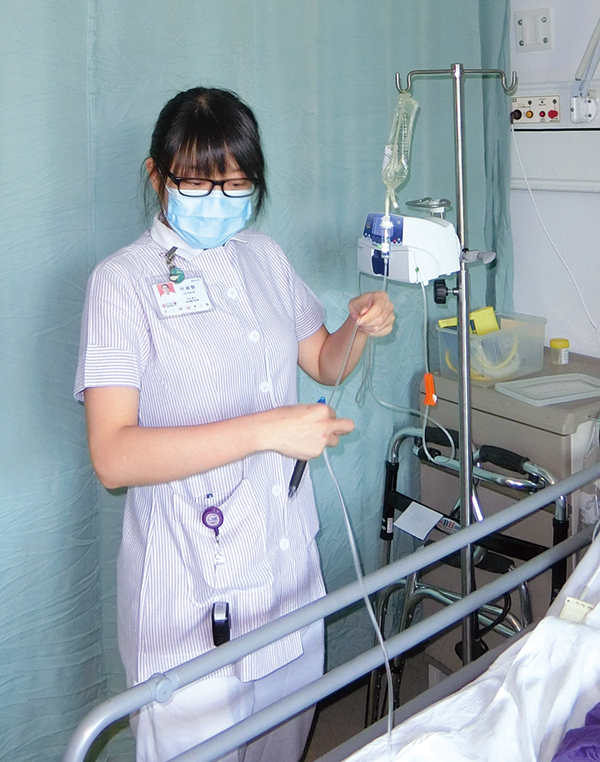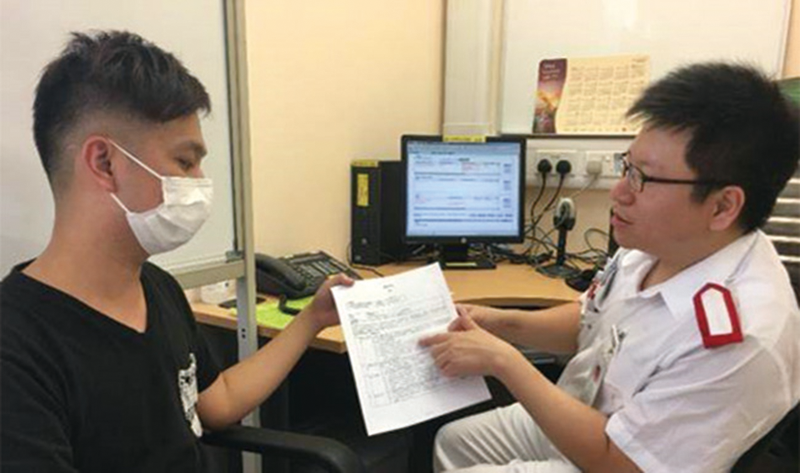Outstanding hospital projects won 5 HMA awards
Results of the Asian Hospital Management Awards 2017 were announced in late August. Five outstanding projects in HA are awarded. The projects improve patient services, streamline service procedures or enhance staff professional development. Congratulations to all winning teams!
Community Involvement Project – Excellence Award
Princess Margaret Hospital
Kwai Tsing Signature Project Scheme: Tripartite
‘Hospital-Welfare-Community’ Collaboration to
Enhance Community Dwelling Elderly Health
The pilot scheme of ‘Estate Nurse Project’ in 2005 by Princess Margaret Hospital (PMH) has developed to Kwai Tsing Signature Project Scheme: Enhance Community Dwelling Elderly Health in 2015. Community nurses in community clinics follow up cases of discharged elderly patients and elders with chronic diseases. Services include health assessment, drug consultation, and empowerment of the elders and their caregivers on chronic disease management. Besides, through cross‑sector service collaboration, elders in need are referred to public and private clinics, allied health and NGOs to reduce hospital admissions. As a public organisation, PMH has assumed corporate social responsibility by establishing a network of care for needy elders in the community.
Talent Development Project – Excellence Award
Hospital Authority Head Office
Nurture Next Allied Health Generation
HA recruits a substantial number of allied health (AH) fresh graduates every year, and the proportion of new recruits with experience less than three years accounts for over 20% of the total AH workforce. To help colleagues adapt to the workplace, the Institute of Advanced Allied Health Studies (IAAHS) put forward ‘The Training and Development Programme for Newly Recruited Allied Health Professionals’ in 2007, and fully implemented it in 15 AH disciplines in 2012. The training programme is developed jointly by corresponding profession committees, experts, frontline staff, Allied Health Training Officers and colleagues from Department of AH Grades and IAAHS. A three‑year systematic training and development plan is formulated for the new recruits. Through rotation in different clinical areas and continuous learning activities, new recruits are equipped with clinical knowledge and skills to handle work duties and provide quality patient services.
Mobile and Online Services Project – Gold Award
Caritas Medical Centre
Project ‘i-Easy’ – An Integrated End‑to‑end Hospital and Patient Mobile Communication System to Reduce Defaults and Cancellations of Scheduled Operations and Procedures
Patients of Kowloon West Cluster Ophthalmic Centre at Caritas Medical Centre can enjoy the convenience once they download and register on the app i-Easy. They will receive reminders one to three days before the appointment on the date, time, admission procedures, pre‑operative instructions, drug instructions and related information, to ensure timely treatment in order to enhance service quality and patient safety. If patients cannot attend scheduled appointment or fail to confirm the instructions, staff will contact them to reschedule the appointment. The original timeslot will be allocated to another patient.
Nursing Excellence Project – Excellence Award
North District Hospital
S-A-F-E to Stop Misconnection of Patients’ Tubings with Tracing
Back Method
Administration of medications, intravenous fluids, urination and oxygen supply via tubings are encountered in nursing care delivery every day. A misconnection may lead to serious harm or even death of patients. Therefore, Central Nursing Division of North District Hospital organised a series of educational and promotional events to raise the awareness of frontline nursing colleagues. In order to ensure patient safety, tracing back practice is needed, apart from identifying the concerned tubing.
Patient Safety Project – Excellence Award
Prince of Wales Hospital
Streamlining the Pathway of Care for Cancer Patients at Risk of Chemotherapy Induced Febrile Neutropenia
Department of Oncology of Prince of Wales Hospital reviewed and streamlined the pathway of care for cancer patients after chemotherapy, and developed a clinical guideline to prioritise cancer patients at risk of chemotherapy induced febrile neutropenia. They will be referred to nurse clinic to learn about the side effects and nursing procedures of chemotherapy, and be given a ‘fever card’. When this group of patients visits the A&E or oncology clinic due to fever, they can be prioritised, prescribed antibiotic, and hospitalised for treatment by showing the ‘fever card’.
● “I have the right to choose.”
COVER STORY
● Support the teams that care for lives
● Paediatric palliative care to debut at new children’s hospital
● A visit to palliative care ward
● Characteristics of palliative care ward
FEATURE
● Green doctor turns waste into treasure
● Growing ‘pot-friendly’ fruits and vegetables
WHAT'S NEW
● Outstanding hospital projects won 5 HMA awards
HELEN HA
● HA staff survey calls for more communication and appreciation
● Web browsing made easy with improved accessibility
APP EXPRESS
● DM Care empowers diabetes patients
STAFF CORNER
● Patients express high confidence in Accident and Emergency service
● Pragmatic leaders are ready for new challenges
● Positive energy fills Psychological Care Carnival
● Teens explored unique summer hospital experience
● Empathy and patience reduce complaints

